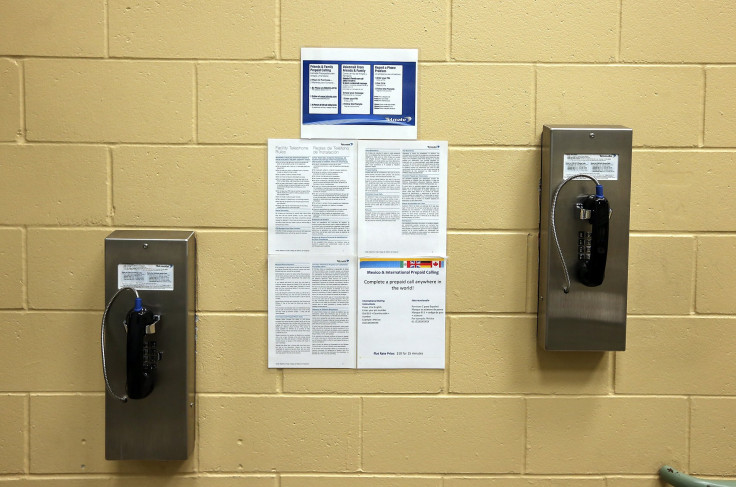Private Tech Firms Securus, GTL Offer Jails Million-Dollar Payments, Tablet Computers For Exclusive Phone Contracts

Prison phone calls are notoriously expensive for inmates and their families. Rates as high as $10 for a 15-minute phone call are not uncommon. But for the private tech companies that provide the service, winning those exclusive contracts is enormously lucrative.
So how exactly do these companies clinch the deals? With million-dollar signing bonuses paid directly to the counties where the jail is located. And free tablet computers -- lots of them.
In proposals for contracts at a county jail in Georgia, for instance, Dallas-based Securus Technologies offered an “upfront signing bonus” of $1,175,000 for a five-year exclusive contract, as well as 110 tablets for inmates -- free of charge. Global Tel*Link (GTL), a Reston, Va.-based firm, countered with $1.5 million upfront offer for a seven-year deal, as well as 150 tablets to be provided at “ZERO” cost. Both offers were made on Feb. 27, 2015, according to the documents.
Securus and GTL are the two largest players in the prison phone business. Together, they control about 80 percent of the market. The signing bonuses are a new tactic in anticipation of regulations that will be set by the Federal Communications Commission later this year that may limit the revenue jails can collect from the calls themselves.
The details of the contracts were revealed on Thursday in a filing to the FCC by a third, smaller competitor, Pay-Tel Communications, which is trying to show the commissioners how these companies operate behind the scenes. Pay-Tel, which declined to speak on the record to International Business Times, obtained the documents through a Freedom of Information Act request. According to a letter submitted to the FCC, these signing bonuses make it difficult for smaller companies to compete in the bid process.
It also shows how much money these two companies are willing to shower on jails in order to win exclusive contracts -- and begin charging high rates to inmates and their families for basic phone services and video visitation.
While it may seem odd that a private company is allowed to offer cash to a public entity in exchange for their business, prison reform advocates aren't too surprised.
Paul Wright, executive director of the Human Rights Defense Center and a vocal critic of the prison phone business, says these sorts of payments -- which he compares to bribes -- are par for the course.
“This goes to show what a dysfunctional and perverse market this is,” Wright says. “Prisoners and families are viewed as money machines. It's a total abdication of public duty by the people running these facilities.”
As IBTimes reported last week, the prison phone business has long been characterized by monopolistic relationships between private companies and public jails, and exorbitant rates and fees charged to families. With about 2.2 million inmates locked up, the industry has grown to a $1.2 billion yearly business for the companies that provide the service.
But perhaps most controversially, the county jails have, for more than a decade, been collecting “commissions” on the revenue generated from phone calls within jail and prison walls.
According to the sheriffs who collect the commissions, this revenue allows the state or county jail to recoup the costs it incurs by offering the phones in the first place.
However, the FCC may soon put an end to this practice. The agency is considering eliminating commissions, which has thrown the industry into tumult.
In fact, both Securus and GTL only offered the “upfront” signing bonus in this case because the jail asked. In a letter dated Jan. 28, 2015, the Georgia jail’s administrator -- whose name has been redacted -- writes: “Since it is highly likely that the FCC will be eliminating all Inmate phone commissions in the near future, in lieu of a (MAG) Minimum Annual Guarantee, please discuss alternatives” that “would provide to supplement the loss of Jail phone revenues.”
For years, advocates have sought reform to make prison and jail phone rates more affordable for family members. “I’m not surprised to see more evidence that these companies want to subvert the FCC’s attempts to bring order to the prison and jail telephone market,” says Peter Wagner, executive director of the Prison Policy Initiative.
Though there are critics of this sort of payment, it’s not exactly illegal. Yet, at least.
“I can't say it's illegal, but there are certainly ethical issues,” says Michael Hamden, an attorney in North Carolina who has advocated for lower phone rates for inmates and their families. “They're a for-profit company, so the idea is that [these signing bonuses] are an investment that they will recoup in the contract." Ultimately, he says, the signing bonuses "seem like an effort to sidestep the FCC's plans to eliminate commissions.”
Neither Securus nor GTL were immediately available to comment.
© Copyright IBTimes 2024. All rights reserved.




















